burnin1
Well-Known Member
From businessinsider.com
San Francisco's first marijuana 'baked sale' shows that edibles are the next multimillion-dollar food industry

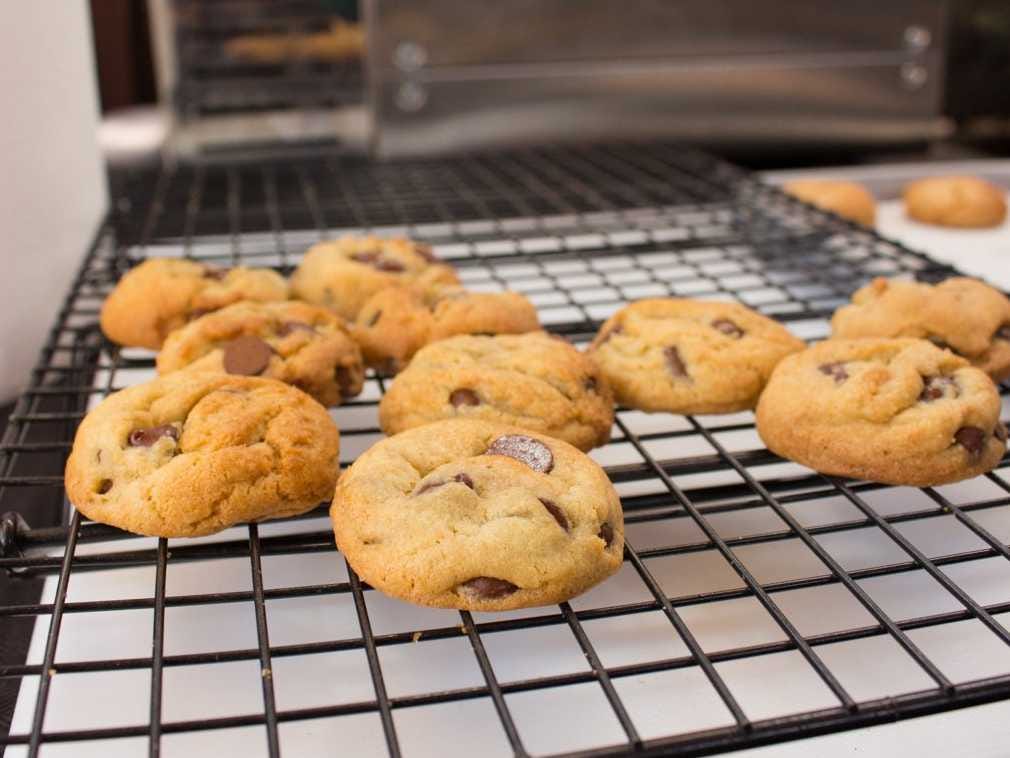
Melia Robinson/Business InsiderThe Big Pete's Sweet Treats six-pack of cannabis-infused chocolate chip cookies are labeled with dosage information.
Last weekend, thousands from the Bay Area poured into the outdoor SoMa StrEAT Food Park for the Get Baked Sale, the first annual food rally for marijuana edibles enthusiasts.
Cannabis is only legal for medicinal use in California, though momentum is growing among supporters who seek to legalize its recreational use in a 2016 ballot initiative. Attendees at the fair had to present a state-authorized medical marijuana identification card at the door and pay $20 in order to enter.
Not unlike most smorgasbords, booths (selling mind-altering treats) lined the urban park. Some vendors lured people over with gimmicks, like free vape pens and a lottery wheel to win a THC-laced doughnut. We saw the usual suspects, pot brownies and cookies, and more daring confections, such as cannabis-infused fortune cookies, mini doughnuts, and ice cream. The crowd was unsurprisingly chill.
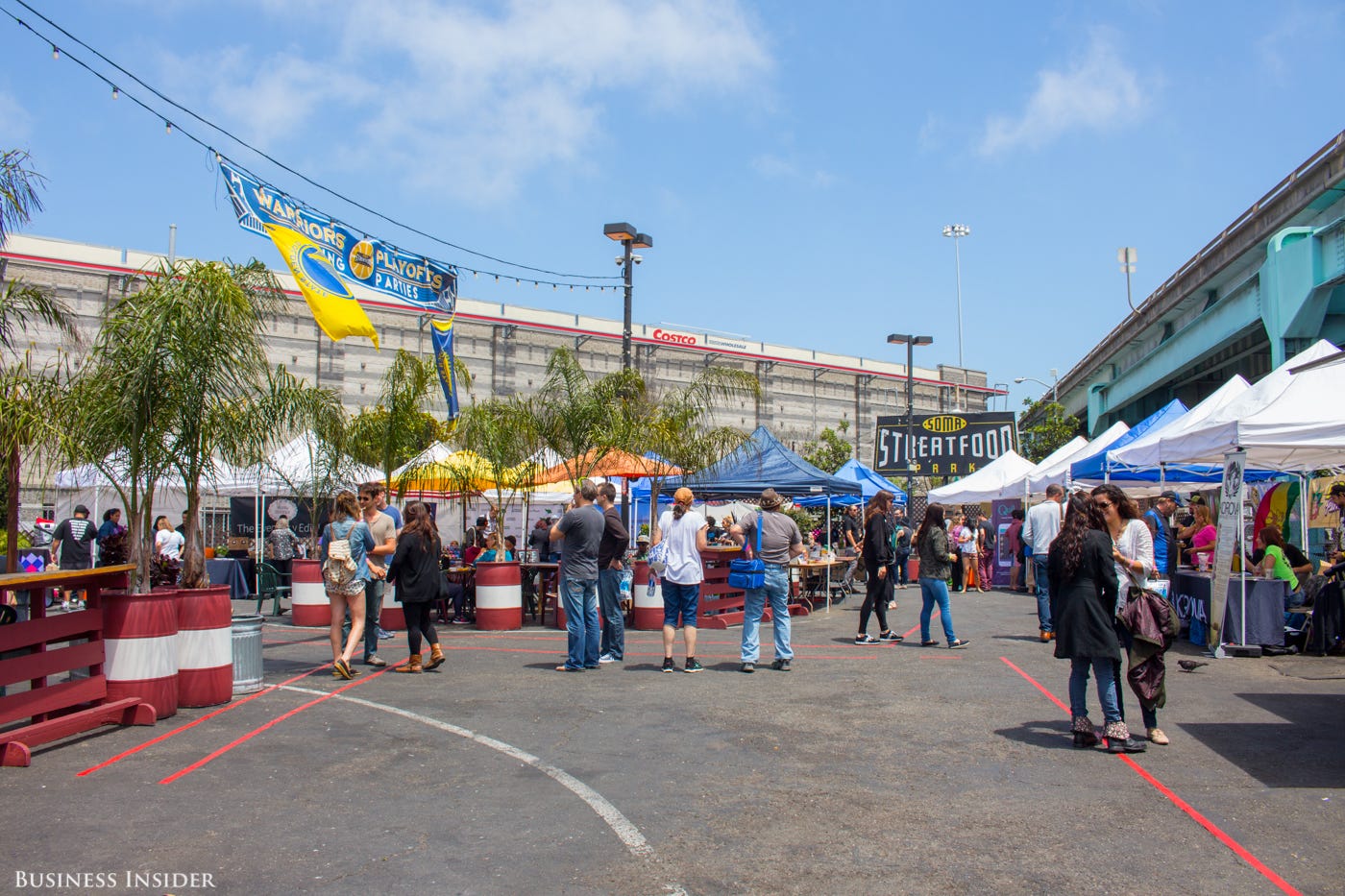
Melia Robinson/Business InsiderWhile most attendees were seasoned users, some newbies tried edibles for the first time at the Get Baked Sale.
Still, some attendees were more enthused than others. One ticket-holder named Sam, who stood out from the crowd with her wisps of mint green-colored hair, told Business Insider she associates edibles with an "inherent terror." This response is not entirely uncommon among amateur users.
Last year, New York Times op-ed columnist Maureen Dowd wrote about her experience eating a pot-laced caramel-chocolate flavored candy bar in a Denver, Colorado, hotel room. She didn't know its dosage of THC, the main psychoactive ingredient in cannabis, or understand how long the high takes to set in, before going back for more bites. Thus, Dowd ate too much pot and spent the night in a fit of trauma and paranoia.
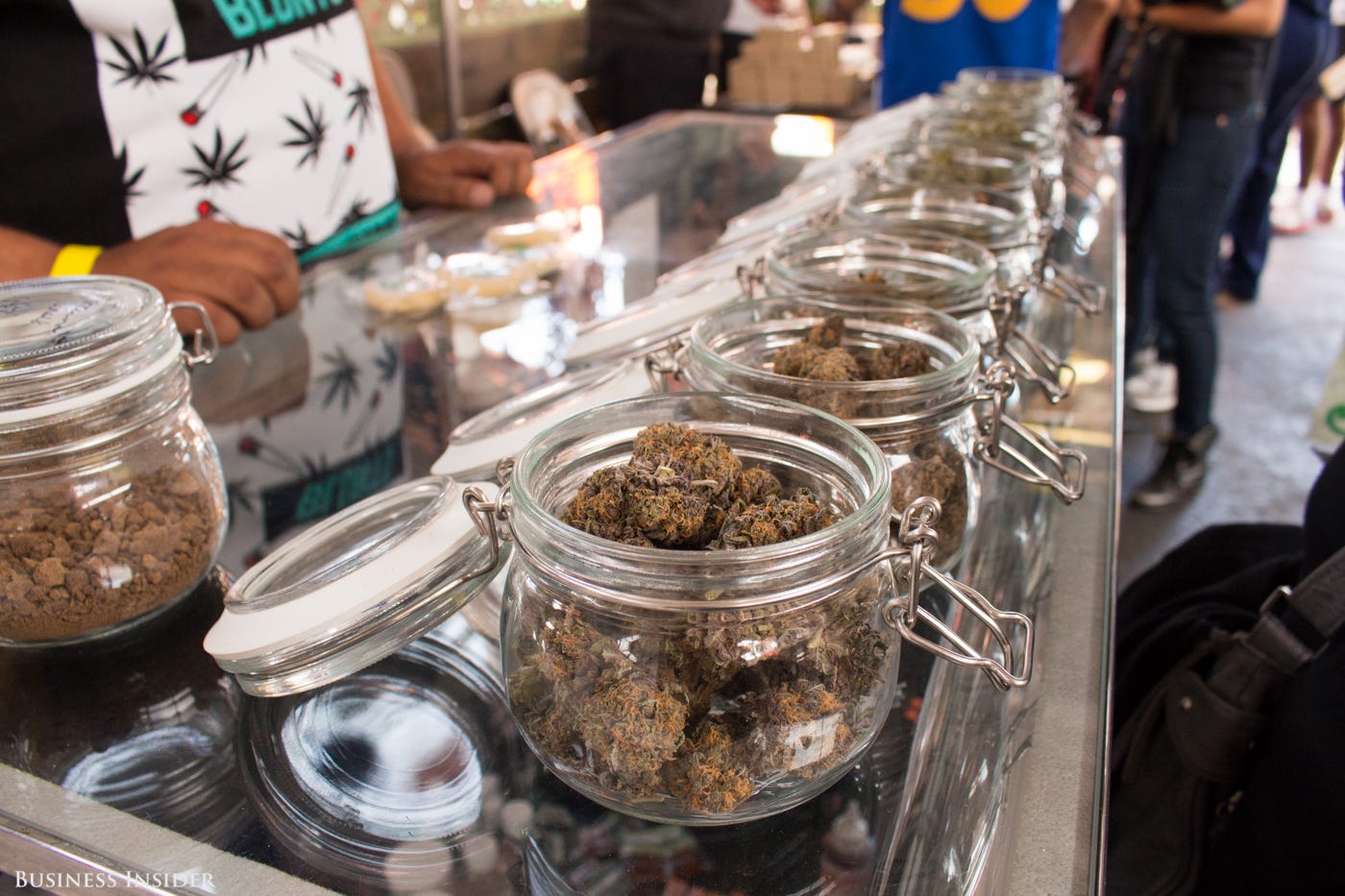
Melia Robinson/Business InsiderTHC transforms into a more intense drug when it is processed as food.
The body processes marijuana differently depending on a variety of factors, from how it is consumed to who is consuming it. When eaten, THC undergoes a transformation in the liver that turns it into "a different drug twice as strong that lasts twice as long as inhaled" THC, Xeni Yardin has written in Boing Boing.
This difference is a bit of a double-edged sword, though: It takes our bodies much, much longer to process cannabis when we ingest it than when we inhale it. "With smoking, the peak blood levels happen within 3-10 minutes, and with eating, its 1-3 hours," Kari Franson, clinical pharmacologist and associate dean for Professional Education in the Department of Clinical Pharmacy, at the University of Colorado Skaggs School of Pharmacy, told Forbes.
And because it takes so long to process, people often overdo it.
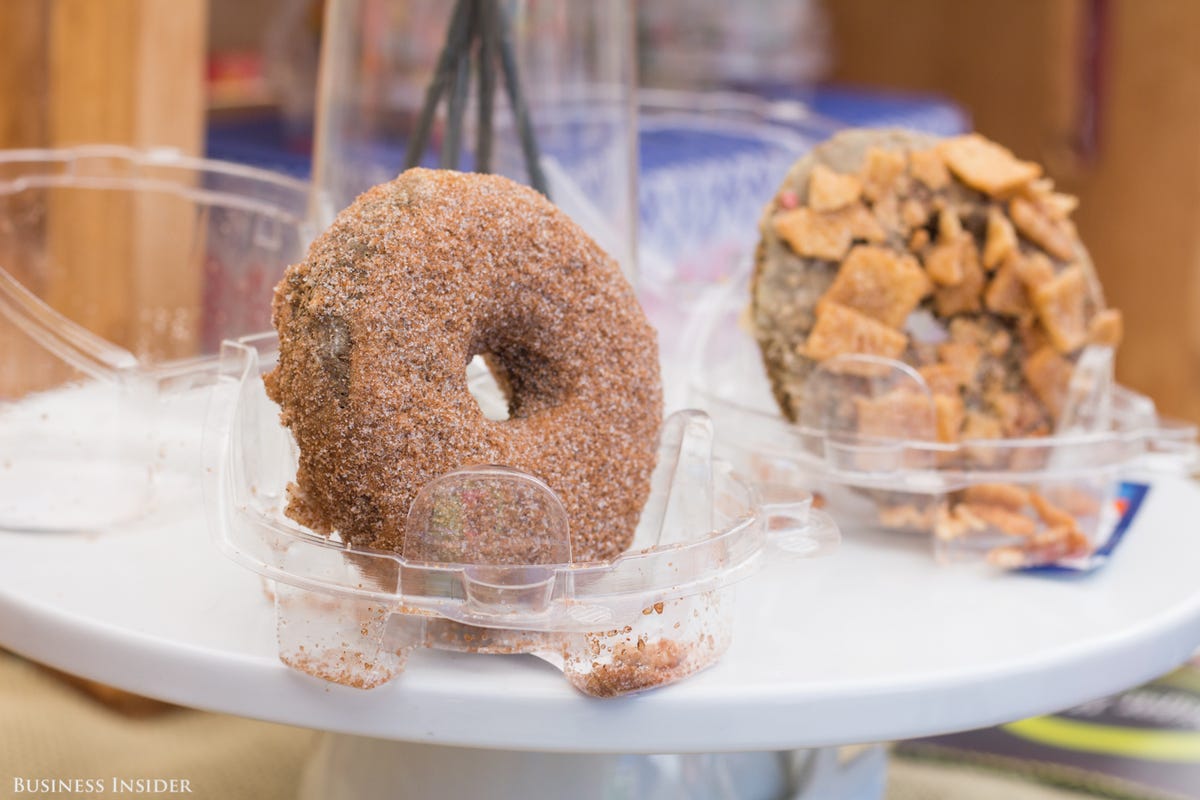
Melia Robinson/Business InsiderSugar High makes single-dose cannabis doughnuts in flavors like cinnamon sugar and "cereal killer."
"Most users are willing to wait 10 minutes, not 3 hours," said Franson, before they take another hit or bite. That makes it a lot easier to self-monitor if you're smoking, but far more difficult if you're snacking on a piece of pot-infused chocolate.
So, could Dowd's unforgettable evening have ended with a movies-on-demand marathon and a good night's sleep rather than a fit of paranoia? Perhaps, had she been educated on the contents of the edible she was using.
In an effort to prevent this kind of experience, some Californian makers of marijuana edibles say they want to smarten up their customers. Every vendor I approached at the Get Baked Sale spoke of a desire to educate the market on how to eat responsibly.
"The good thing about [consuming too much] weed is, it can't kill you," says Kim Geraghty, cofounder of Madame Munchie, whose gourmet cannabis macarons won the 2014 San Francisco High Times Cannabis Cup. "But it can make you very uncomfortable."
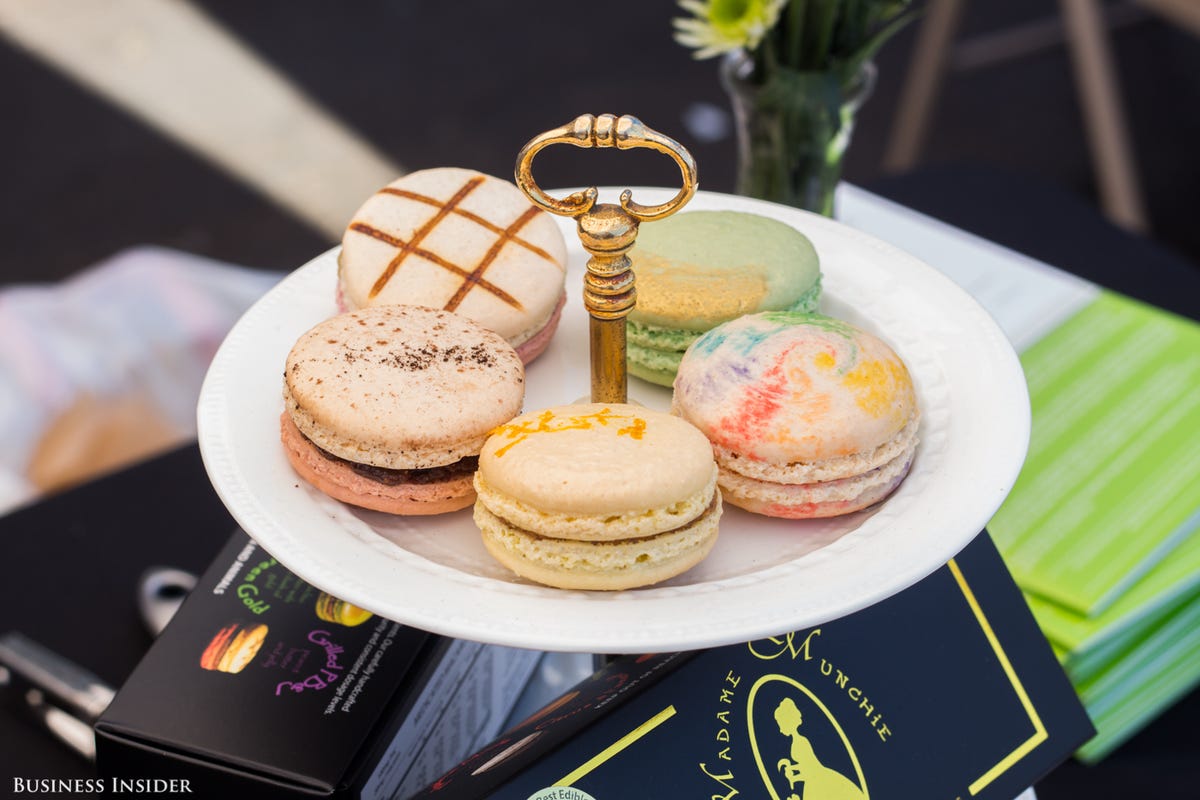
Melia Robinson/Business Insider
To try and keep their users from having a negative experience with their product, Geraghty and her partner Ashley Martino say they send their products to a lab that specializes in determining the cannabinoid content of infused foods. Each carton of macarons, which come in five mouth-watering flavors including Hazelnut Mocha and Grilled PB&J, states its THC dosage.
Research has shown that these labels can be inaccurate. Lab tests on various edible marijuana products, for example, have shown the amount of THC can be far higher or lower than what is promised on the label.
Two recent Colorado laws have attempted to address these issues. One in 2014 started requiring makers of edibles to have their THC content tested and verified by independent labs; another in 2015 mandates that edibles sold recreationally be wrapped individually or marked in increments of 10 or fewer milligrams of THC. The regulations remain scattered by state, and California has no statewide labeling laws.
That won't be true for long. Should California follow in the footsteps of Colorado, Washington, Alaska, and Oregon, and legalize marijuana for recreational use in 2016, the rules will tighten.
The stakes are high.
Edibles could emerge as a multimillion-dollar food industry in the northwest in the next few years. Manufacturers like Geraghty, who left a career in finance in order to launch Madame Munchie, believe exercising best practices, like product testing and labeling, will place them ahead of the curve.
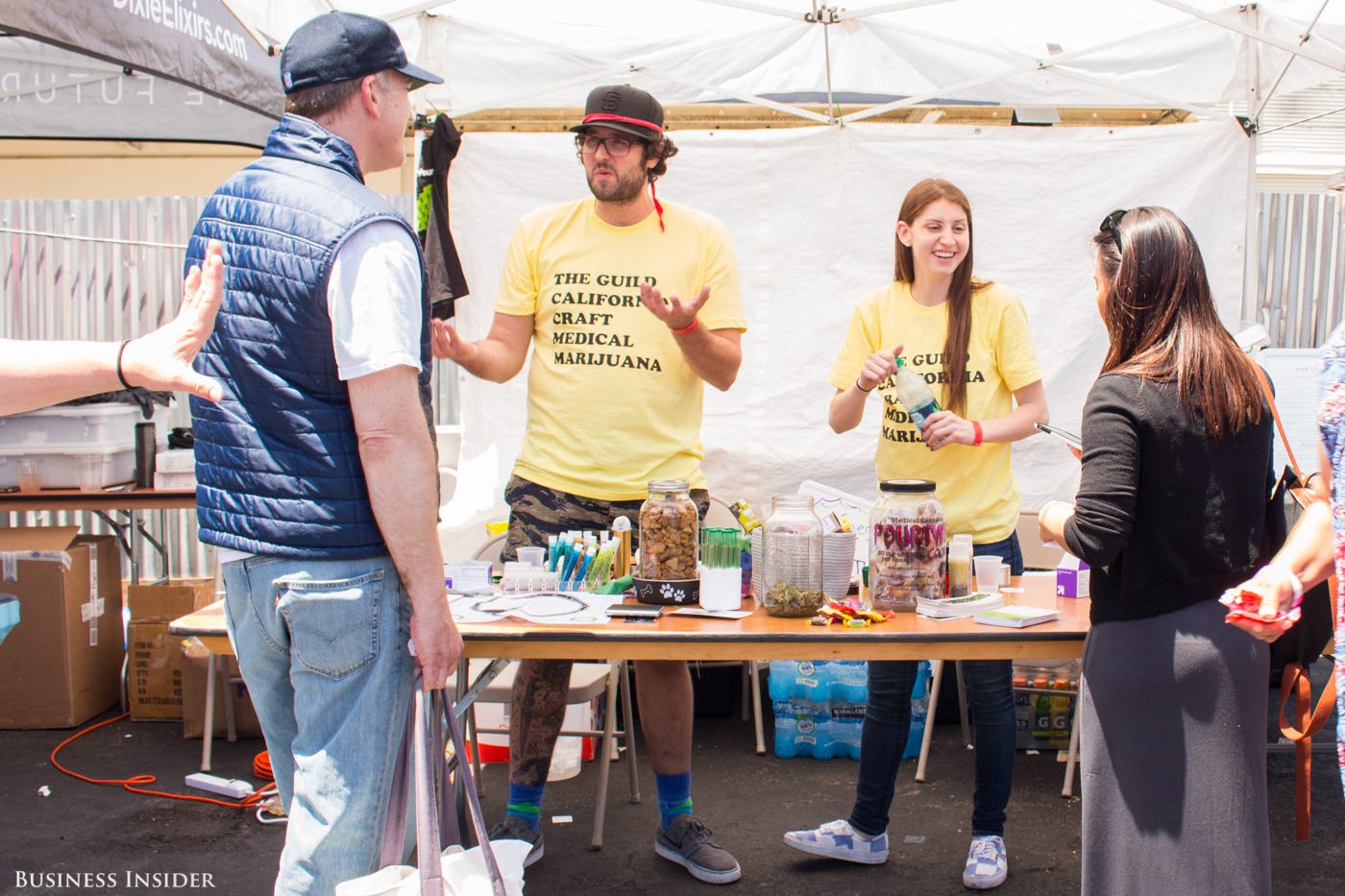
Melia Robinson/Business InsiderRonald "RJ" Falcioni and Emily Thrope founded The Guild, the "Birchbox of marijuana" to help connect consumers with the highest quality manufacturers.
For some small-scale producers, sending their products to be lab-tested is an expensive and arduous process. Ronald "RJ" Falcioni and Emily Thrope created The Guild, a nonprofit collective that launched a subscription-based cannabis delivery service just two months ago, to make it easier.
Called the "Birchbox of marijuana," The Guild curates the highest quality edibles, concentrates, and cannabidiols and packages them in unique combinations at varying price points. Customers may subscribe for weekly or monthly deliveries, and customize their box based on their taste preferences and desires or needs. If a bakery that the collective enjoys can't commit to testing its products, The Guild will offer to send the products to the lab and foot the bill.
Thrope, who recently relocated to San Francisco after working as a real estate agent in New York City, told Business Insider at the Get Baked Sale that their goal is to get edibles manufacturers up to code before the legislation catches up with recreational use.
"We're getting ready for the change," Thrope says, screwing the cap back on a jar of gumdrops loaded with THC. "It's coming."
Read more: http://www.businessinsider.com/get-baked-sale-san-francisco-marijuana-edibles-2015-6#ixzz3dcL1RQib
San Francisco's first marijuana 'baked sale' shows that edibles are the next multimillion-dollar food industry

- Melia Robinson
- Jun. 20, 2015, 4:20 AM

Melia Robinson/Business InsiderThe Big Pete's Sweet Treats six-pack of cannabis-infused chocolate chip cookies are labeled with dosage information.
Last weekend, thousands from the Bay Area poured into the outdoor SoMa StrEAT Food Park for the Get Baked Sale, the first annual food rally for marijuana edibles enthusiasts.
Cannabis is only legal for medicinal use in California, though momentum is growing among supporters who seek to legalize its recreational use in a 2016 ballot initiative. Attendees at the fair had to present a state-authorized medical marijuana identification card at the door and pay $20 in order to enter.
Not unlike most smorgasbords, booths (selling mind-altering treats) lined the urban park. Some vendors lured people over with gimmicks, like free vape pens and a lottery wheel to win a THC-laced doughnut. We saw the usual suspects, pot brownies and cookies, and more daring confections, such as cannabis-infused fortune cookies, mini doughnuts, and ice cream. The crowd was unsurprisingly chill.

Melia Robinson/Business InsiderWhile most attendees were seasoned users, some newbies tried edibles for the first time at the Get Baked Sale.
Still, some attendees were more enthused than others. One ticket-holder named Sam, who stood out from the crowd with her wisps of mint green-colored hair, told Business Insider she associates edibles with an "inherent terror." This response is not entirely uncommon among amateur users.
Last year, New York Times op-ed columnist Maureen Dowd wrote about her experience eating a pot-laced caramel-chocolate flavored candy bar in a Denver, Colorado, hotel room. She didn't know its dosage of THC, the main psychoactive ingredient in cannabis, or understand how long the high takes to set in, before going back for more bites. Thus, Dowd ate too much pot and spent the night in a fit of trauma and paranoia.

Melia Robinson/Business InsiderTHC transforms into a more intense drug when it is processed as food.
The body processes marijuana differently depending on a variety of factors, from how it is consumed to who is consuming it. When eaten, THC undergoes a transformation in the liver that turns it into "a different drug twice as strong that lasts twice as long as inhaled" THC, Xeni Yardin has written in Boing Boing.
This difference is a bit of a double-edged sword, though: It takes our bodies much, much longer to process cannabis when we ingest it than when we inhale it. "With smoking, the peak blood levels happen within 3-10 minutes, and with eating, its 1-3 hours," Kari Franson, clinical pharmacologist and associate dean for Professional Education in the Department of Clinical Pharmacy, at the University of Colorado Skaggs School of Pharmacy, told Forbes.
And because it takes so long to process, people often overdo it.

Melia Robinson/Business InsiderSugar High makes single-dose cannabis doughnuts in flavors like cinnamon sugar and "cereal killer."
"Most users are willing to wait 10 minutes, not 3 hours," said Franson, before they take another hit or bite. That makes it a lot easier to self-monitor if you're smoking, but far more difficult if you're snacking on a piece of pot-infused chocolate.
So, could Dowd's unforgettable evening have ended with a movies-on-demand marathon and a good night's sleep rather than a fit of paranoia? Perhaps, had she been educated on the contents of the edible she was using.
In an effort to prevent this kind of experience, some Californian makers of marijuana edibles say they want to smarten up their customers. Every vendor I approached at the Get Baked Sale spoke of a desire to educate the market on how to eat responsibly.
"The good thing about [consuming too much] weed is, it can't kill you," says Kim Geraghty, cofounder of Madame Munchie, whose gourmet cannabis macarons won the 2014 San Francisco High Times Cannabis Cup. "But it can make you very uncomfortable."

Melia Robinson/Business Insider
To try and keep their users from having a negative experience with their product, Geraghty and her partner Ashley Martino say they send their products to a lab that specializes in determining the cannabinoid content of infused foods. Each carton of macarons, which come in five mouth-watering flavors including Hazelnut Mocha and Grilled PB&J, states its THC dosage.
Research has shown that these labels can be inaccurate. Lab tests on various edible marijuana products, for example, have shown the amount of THC can be far higher or lower than what is promised on the label.
Two recent Colorado laws have attempted to address these issues. One in 2014 started requiring makers of edibles to have their THC content tested and verified by independent labs; another in 2015 mandates that edibles sold recreationally be wrapped individually or marked in increments of 10 or fewer milligrams of THC. The regulations remain scattered by state, and California has no statewide labeling laws.
That won't be true for long. Should California follow in the footsteps of Colorado, Washington, Alaska, and Oregon, and legalize marijuana for recreational use in 2016, the rules will tighten.
The stakes are high.
Edibles could emerge as a multimillion-dollar food industry in the northwest in the next few years. Manufacturers like Geraghty, who left a career in finance in order to launch Madame Munchie, believe exercising best practices, like product testing and labeling, will place them ahead of the curve.

Melia Robinson/Business InsiderRonald "RJ" Falcioni and Emily Thrope founded The Guild, the "Birchbox of marijuana" to help connect consumers with the highest quality manufacturers.
For some small-scale producers, sending their products to be lab-tested is an expensive and arduous process. Ronald "RJ" Falcioni and Emily Thrope created The Guild, a nonprofit collective that launched a subscription-based cannabis delivery service just two months ago, to make it easier.
Called the "Birchbox of marijuana," The Guild curates the highest quality edibles, concentrates, and cannabidiols and packages them in unique combinations at varying price points. Customers may subscribe for weekly or monthly deliveries, and customize their box based on their taste preferences and desires or needs. If a bakery that the collective enjoys can't commit to testing its products, The Guild will offer to send the products to the lab and foot the bill.
Thrope, who recently relocated to San Francisco after working as a real estate agent in New York City, told Business Insider at the Get Baked Sale that their goal is to get edibles manufacturers up to code before the legislation catches up with recreational use.
"We're getting ready for the change," Thrope says, screwing the cap back on a jar of gumdrops loaded with THC. "It's coming."
Read more: http://www.businessinsider.com/get-baked-sale-san-francisco-marijuana-edibles-2015-6#ixzz3dcL1RQib




